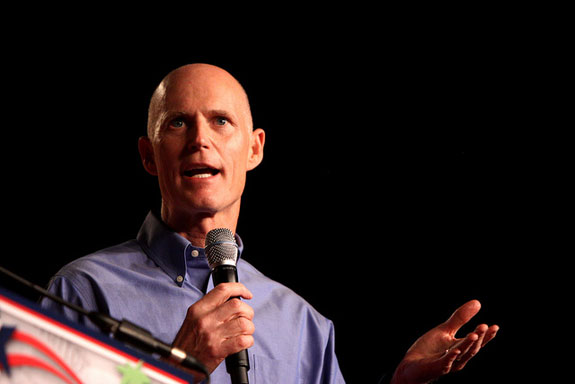
Gov. Rick Scott is up for reelection in two years. Who will challenge him? (Photo by Gage Skidmore.)
By Ashley Lopez
Florida Center for Investigative Reporting
Now that this year’s presidential election is behind us, all eyes (and political money) will slowly shift toward Florida Gov. Rick Scott’s reelection bid in 2014.
Through most of Scott’s first term as governor, he has been the least popular governor in the country. There have been several attempts to remake his image, but little has worked to reverse the state’s and country’s persistent dislike of Scott.
Even though Republican presidential candidate Mitt Romney badly needed Florida to win the presidency, for example, he kept Scott far away from his campaign. It wasn’t until the last day of the campaign that Romney invited the governor to make a single appearance in one of his Florida campaign stops.
This is all largely considered a liability for Scott’s reelection, which is why through most of his term, the chattering classes have been talking about who might attempt to oust him.
Here’s a rundown of some of the speculation, as well as some confirmed candidates:
- Former Republican Florida Gov. Charlie Crist. The speculation is that that Crist will run in 2014 as a Democrat. He has made several appearances with President Obama and sided with Florida Democrats on controversial issues such as voting rights. He even gave a speech at the Democratic National Convention in Charlotte, N.C., this year. Crist was a popular governor and has stayed in the public eye long enough to be a viable candidate in two years. The question is, can Crist, a former Republican, win over the state’s liberal base?
- State Sen. Nan Rich has officially thrown her hat in the ring to face off with Scott in 2014. Rich is the Florida Senate minority leader from Sunrise, in Broward County. She is well respected in the state Legislature and was able to use her political savvy (as well as a coalition of moderate Republican women in the Senate) to stop controversial legislation last year that would have privatized prisons, cracked down on abortions and allowed parents to turn public schools into charter schools. However, Rich also has very little statewide name recognition, which could make her viability in a gubernatorial election — even against a very unpopular governor — weak.
- Former Democratic gubernatorial candidate Alex Sink could run again against Scott. Polls have consistently shown that if the 2010 election were done over, she would win. However, in 2010 she was unable to raise enough money to combat the onslaught of ads Scott purchased on his own. She was also unable to get the Democratic base in Florida excited enough to turn out for the midterm election.
- Dan Gelber, a former Democratic state Senator, is well liked by the liberal base in Florida and would receive big support from the party. He has significant name recognition in the state. In the past few years, Gelber has stayed in the newspapers, writing op-eds critical of Scott and the GOP-controlled Legislature.
And then there’s speculation that the Republicans could turn on Scott, with another GOP candidate challenging the unpopular incumbent in the primary. However, it’s still unclear how strongly the GOP is standing behind Gov. Scott.
The biggest worries for Democrats looking to oust Scott, however, include whether they can raise enough money for their candidate to go toe-to-toe with the wealthy incumbent. Scott has millions as his disposal as well as support from big business in the state. Anyone who runs against him must prepare to spend millions of dollars on ads just to keep up.
Democrats also must worry about another midterm enthusiasm gap in 2014, such as the one that occurred in 2010. President Obama has been able to win elections in Florida because he has had the ability to get Democrats to the polls here, a problem that has always plagued Florida Democrats when Obama isn’t on the ballot.
Democrats registered 300,000 new voters this year, but they have always had a state lead in registration. The endless problem for Democrats is getting those registered voters to the polls.
